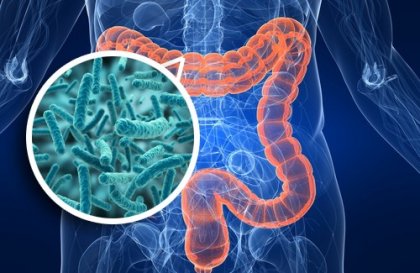Can Gut Bacteria Influence Your Emotions?

For centuries now we’ve used the saying “Mens sana in corpore sano” (a healthy mind in a healthy body.) And though the meaning that we give it now differs significantly from the original, studies show that a healthy body is the home of a healthy mind on many different levels. Among the evidence that backs up this theory is an important study from the last few years. This study looks at the relationship between gut bacteria, the brain, and emotions.
A relatively short time ago, scientists found a surprising relationship between emotions and our gut bacteria. In fact, intestinal bacteria have become a hot issue for researchers in the past few years.
The close relationship between the gut and the brain
All of us are familiar with the feeling of having butterflies in our stomach. Recent research has found that there is some truth in that metaphor. Since the beginning of the 21st century, scientists have looked at the relationship between the bacteria that live in our gut, and mental health.
However, this isn’t exactly a new field of research. In the early 20th century, doctors and scientists wrote a lot about this connection. They discussed how the content of the colon, especially the harmful bacteria that live there, could contribute to fatigue, depression, and neurosis.
Scientists initially rejected those first studies and hypotheses about the influence of gut bacteria on the brain as pseudoscientific. However, about 15 years ago they started to revisit the connection between the gut and the brain. As researchers continue to investigate this subject, they are discovering that the communication between the brain and the gut is actually a two-way street.
The brain influences immune as well as gastrointestinal functions. Those functions can actually alter the composition of the gut’s microbiome. Also, bacteria in the gut produce neuroactive compounds, neurotransmitters, and other metabolites that act on the brain.
In studies on mice, researchers have discovered that some of these compounds can affect the permeability of the blood-brain barrier. This barrier is what prevents harmful substances in the blood from entering the brain.

Gut bacteria and mood
A few years ago, the scientific community began to study the concrete effect that gut bacteria could have on emotions. They discovered that the microorganisms in our gut secrete a large number of chemical substances.
Among these are the same substances that our neurons use to communicate and regulate our mood. These include dopamine, serotonin, and gamma-Aminobutyric acid (GABA.) These substances appear to play a role in intestinal disorders that coincide with high levels of severe depression and anxiety.
In addition, we’ve known for a while that a large part of our neurochemical supply originates in the gut. That is where these chemical signals regulate appetite and feelings of fullness and digestion. However, it wasn’t until a few years ago that research started taking into account the role of microbes in the release of these special chemical substances.
The role of brain-gut-microbiota interactions
Recently, researchers at UCLA identified the intestinal microbiota that interacts with the regions of the brain associated with mood and behavior. This could be the first time that scientists have identified the behavioral and neurobiological differences associated with the microbial composition in healthy humans. Previously scientists conducted all research in this field on animals.

This study confirms that the brain-gut-microbiota interactions can play an important role in our health and behavior. Previous studies suggest that the microbiota (the community of microorganisms in the intestine) can influence behavior and emotion.
But, does the gut have an influence on the brain or the brain on the gut? It isn’t clear if the gut has an influence on the brain and its development, or vice-versa. Researchers warn that it is difficult to draw causal conclusions because this is a young field. Most of the large-scale studies on this subject are still underway.
The importance of gut bacteria
Research on the influence of gut bacteria on the brain is ongoing. We have much to discover and clarify. Up to now, the different lines of investigation explain the following:
- The microbiota of the gut is a large population that is important for healthy metabolism and brain function.
- The lines of gut-brain communication include neuronal connections.
- Gut microbiota is important during early development and can influence the “wiring” of stress circuits in the brain.
- Probiotics, or “good bacteria” can have a beneficial impact on mood-related symptoms.
There’s no doubt that the microbiota plays an important role in our health and our mood. We should think of it as a part of a complex and multi-faceted system of communication. It is necessary to maintain a healthy balance in the brain. So, as we wait for more research to be published, we should take care of our bodies and listen to the messages they send us.
For centuries now we’ve used the saying “Mens sana in corpore sano” (a healthy mind in a healthy body.) And though the meaning that we give it now differs significantly from the original, studies show that a healthy body is the home of a healthy mind on many different levels. Among the evidence that backs up this theory is an important study from the last few years. This study looks at the relationship between gut bacteria, the brain, and emotions.
A relatively short time ago, scientists found a surprising relationship between emotions and our gut bacteria. In fact, intestinal bacteria have become a hot issue for researchers in the past few years.
The close relationship between the gut and the brain
All of us are familiar with the feeling of having butterflies in our stomach. Recent research has found that there is some truth in that metaphor. Since the beginning of the 21st century, scientists have looked at the relationship between the bacteria that live in our gut, and mental health.
However, this isn’t exactly a new field of research. In the early 20th century, doctors and scientists wrote a lot about this connection. They discussed how the content of the colon, especially the harmful bacteria that live there, could contribute to fatigue, depression, and neurosis.
Scientists initially rejected those first studies and hypotheses about the influence of gut bacteria on the brain as pseudoscientific. However, about 15 years ago they started to revisit the connection between the gut and the brain. As researchers continue to investigate this subject, they are discovering that the communication between the brain and the gut is actually a two-way street.
The brain influences immune as well as gastrointestinal functions. Those functions can actually alter the composition of the gut’s microbiome. Also, bacteria in the gut produce neuroactive compounds, neurotransmitters, and other metabolites that act on the brain.
In studies on mice, researchers have discovered that some of these compounds can affect the permeability of the blood-brain barrier. This barrier is what prevents harmful substances in the blood from entering the brain.

Gut bacteria and mood
A few years ago, the scientific community began to study the concrete effect that gut bacteria could have on emotions. They discovered that the microorganisms in our gut secrete a large number of chemical substances.
Among these are the same substances that our neurons use to communicate and regulate our mood. These include dopamine, serotonin, and gamma-Aminobutyric acid (GABA.) These substances appear to play a role in intestinal disorders that coincide with high levels of severe depression and anxiety.
In addition, we’ve known for a while that a large part of our neurochemical supply originates in the gut. That is where these chemical signals regulate appetite and feelings of fullness and digestion. However, it wasn’t until a few years ago that research started taking into account the role of microbes in the release of these special chemical substances.
The role of brain-gut-microbiota interactions
Recently, researchers at UCLA identified the intestinal microbiota that interacts with the regions of the brain associated with mood and behavior. This could be the first time that scientists have identified the behavioral and neurobiological differences associated with the microbial composition in healthy humans. Previously scientists conducted all research in this field on animals.

This study confirms that the brain-gut-microbiota interactions can play an important role in our health and behavior. Previous studies suggest that the microbiota (the community of microorganisms in the intestine) can influence behavior and emotion.
But, does the gut have an influence on the brain or the brain on the gut? It isn’t clear if the gut has an influence on the brain and its development, or vice-versa. Researchers warn that it is difficult to draw causal conclusions because this is a young field. Most of the large-scale studies on this subject are still underway.
The importance of gut bacteria
Research on the influence of gut bacteria on the brain is ongoing. We have much to discover and clarify. Up to now, the different lines of investigation explain the following:
- The microbiota of the gut is a large population that is important for healthy metabolism and brain function.
- The lines of gut-brain communication include neuronal connections.
- Gut microbiota is important during early development and can influence the “wiring” of stress circuits in the brain.
- Probiotics, or “good bacteria” can have a beneficial impact on mood-related symptoms.
There’s no doubt that the microbiota plays an important role in our health and our mood. We should think of it as a part of a complex and multi-faceted system of communication. It is necessary to maintain a healthy balance in the brain. So, as we wait for more research to be published, we should take care of our bodies and listen to the messages they send us.
All cited sources were thoroughly reviewed by our team to ensure their quality, reliability, currency, and validity. The bibliography of this article was considered reliable and of academic or scientific accuracy.
- Foster, J. A., & McVey Neufeld, K. A. (2013). Gut-brain axis: How the microbiome influences anxiety and depression. Trends in Neurosciences. https://doi.org/10.1016/j.tins.2013.01.005
- Cryan, J. F., & Dinan, T. G. (2012). Mind-altering microorganisms: The impact of the gut microbiota on brain and behaviour. Nature Reviews Neuroscience. https://doi.org/10.1038/nrn3346
- Sommer, F., & Bäckhed, F. (2013). The gut microbiota-masters of host development and physiology. Nature Reviews Microbiology. https://doi.org/10.1038/nrmicro2974
This text is provided for informational purposes only and does not replace consultation with a professional. If in doubt, consult your specialist.







